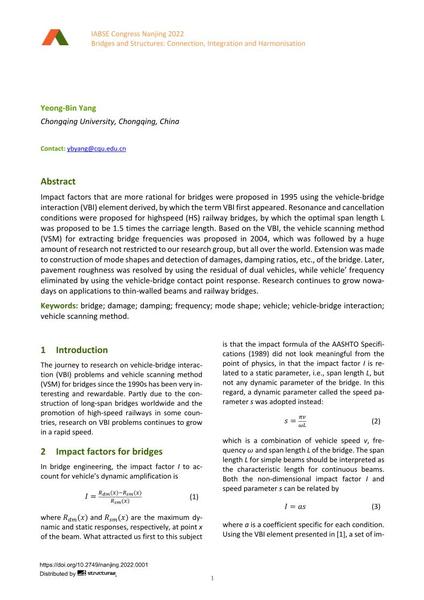Research on Vehicle-Bridge Interaction Dynamics since 1990s

|
|
|||||||||||
Bibliographic Details
| Author(s): |
Yeong-bin Yang
(Chongqing University, Chongqing, China)
|
||||
|---|---|---|---|---|---|
| Medium: | conference paper | ||||
| Language(s): | English | ||||
| Conference: | IABSE Congress: Bridges and Structures: Connection, Integration and Harmonisation, Nanjing, People's Republic of China, 21-23 September 2022 | ||||
| Published in: | IABSE Congress Nanjing 2022 | ||||
|
|||||
| Page(s): | 1-4 | ||||
| Total no. of pages: | 4 | ||||
| DOI: | 10.2749/nanjing.2022.0001 | ||||
| Abstract: |
Impact factors that are more rational for bridges were proposed in 1995 using the vehicle-bridge interaction (VBI) element derived, by which the term VBI first appeared. Resonance and cancellation conditions were proposed for highspeed (HS) railway bridges, by which the optimal span length L was proposed to be 1.5 times the carriage length. Based on the VBI, the vehicle scanning method (VSM) for extracting bridge frequencies was proposed in 2004, which was followed by a huge amount of research not restricted to our research group, but all over the world. Extension was made to construction of mode shapes and detection of damages, damping ratios, etc., of the bridge. Later, pavement roughness was resolved by using the residual of dual vehicles, while vehicle’ frequency eliminated by using the vehicle-bridge contact point response. Research continues to grow nowa- days on applications to thin-walled beams and railway bridges. |
||||
| Keywords: |
bridge damage damping frequency vehicle-bridge interaction Vehicle mode shape vehicle scanning method
|
||||
| Copyright: | © 2022 International Association for Bridge and Structural Engineering (IABSE) | ||||
| License: | This creative work is copyrighted material and may not be used without explicit approval by the author and/or copyright owner. |
||||
